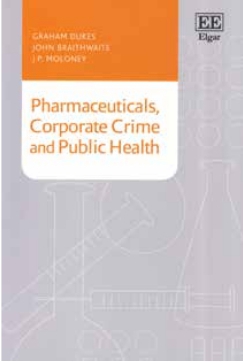Serviços Personalizados
Artigo
Indicadores
Links relacionados
-
 Citado por Google
Citado por Google -
 Similares em Google
Similares em Google
Compartilhar
SAMJ: South African Medical Journal
versão On-line ISSN 2078-5135
versão impressa ISSN 0256-9574
SAMJ, S. Afr. med. j. vol.105 no.8 Pretoria Ago. 2015
BOOK REVIEW
Pharmaceuticals, Corporate Crime and Public Health

By G Dukes, J Braithwaite and J P Moloney. Cheltenham, UK: Edward Elgar Publishing Ltd, 2014. ISBN 978 178471 361 4.
This comprehensive, probing and helpful book can be described as 'compulsory reading for all responsible healthcare practitioners'. Its three authors have a long history of association with and analysis of the international pharmaceutical industry, having identified and written about a range of its activities for the past half century. In this book they go one step further than the usual criticisms by offering achievable strategies to improve practices and result in more positive outcomes than those that have beset the industry over so many years. The fact that malpractice appears to be on the increase is adequate reason for updating the picture and offering remedies, as they have done.
The book is divided into three parts. In Part 1, the introduction, Graham Dukes, a prominent researcher, academic and author who is both a doctor and a lawyer, sets the scene by referring to some of his personal experiences from employee in the industry to national drug regulation, to the World Health Organization, and ultimately to a university environment where he continues to pursue his studies of the industry.
Part 2 considers pharmaceutical rights and wrongs as they have developed over the past 50 years, by considering in turn the main aspects of the industry's activities: research, production, information, distribution and pricing. Questionable practices that detract from the industry's important role in society are also examined. They include the use of anonymous 'ghost-writers' to speed up and 'improve' clinical trial reports and publications, the promotion of 'off-label use' and other poor practices in drug promotion, cover-ups of serious adverse effects identified in pre- and post-marketing practice, 'disease-mongering', 'evergreening' to manipulate patent expiry constraints, bribery and corruption. That these practices continue is illustrated by criminal and civil penalties amounting to more than USD12.6 billion over the past 10 years, many of which are related to false claims/advertising by well-known names in the medicines and pharmaceutical industries. One is reminded of one cynical response to the banking scandals of the past few years: 'too big to fail, too big to jail, too big to nail'.
What is critical in this environment is to provide for and encourage a 'best practice' approach to all these challenges, so that the industry, regulatory authorities, healthcare professionals, society and patients benefit more and experience fewer negative outcomes than they have in the past.
Part 3 of the book, 'Transforming the way ahead', focuses on possible and realistic options to respond to the challenges faced by the industry in an environment that is ever more competitive but in which access to information allows individuals and organisations the opportunity to contribute towards improvement. New thinking and fresh approaches, including responsive regulation, supports and sanctions of the industry and the use of private involvement in enforcement, are suggested and described. The rise of Brazil, India and China in international affairs and the role of South Africa in Africa offer hope for a so-called new 'drug diplomacy'. The role of 'ethical dissenters', including Bill and Melinda Gates, in reformation is also explored.
While this book highlights many of the challenges that have been described previously, it goes beyond other publications by offering a way ahead so that in the future the pharmaceutical industry can take its rightful place as an ethical producer of medicinal remedies that benefit all.
R S Summers
Emeritus Professor, Sefako Makgatho Health Sciences University, Pretoria, South Africa. robert.summers@smu.ac.za














